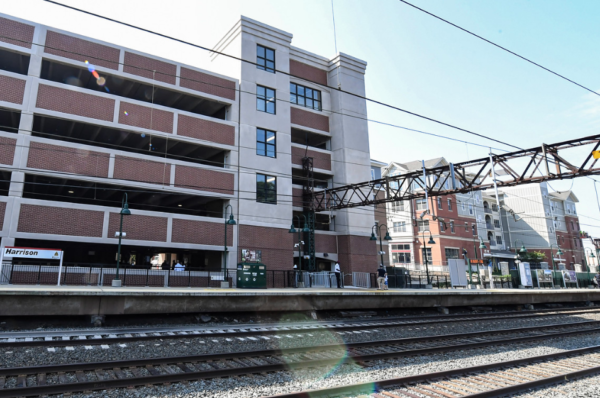Five Westchester and Hudson Valley organizations have joined in a push for the New York State Legislature to pass legislation that could help create more housing in numerous communities. The organizations are: the Building and Realty Institute of Westchester and the Mid-Hudson Region (BRI); the Construction Industry Council of Westchester and Hudson Valley (CIC); the Hudson Gateway Association of Realtors (HGAR); Nonprofit Westchester (NPW); and the Westchester County Association (WCA).
They’re focusing on two sections of the Education, Labor and Family Assistance legislation that is set for funding under the Fiscal Year 2023 Executive Budget that was introduced recently by Gov. Kathy Hochul.
Part EE of the legislation, also known as the “Transit Oriented Development Act of 2022,” encourages transit-oriented development and overrides local zoning which may impede development of housing near train stations and bus depots.

Transit-oriented development in Harrison
Part AA of the legislation, known as the “Accessory Dwelling Unit Act of 2022,” would allow an additional residential unit to be created on all lots with existing residential uses, whether single-family or multifamily. The accessory dwelling units could be attached or detached.
The five organizations joined in a letter to members of Westchester’s legislative delegation. They underscored that the most recent housing needs assessment conducted by the county found that there’s a significant shortage and 11,703 new housing units are needed. The assessment found that more than 20% of Westchester’s households spend more than 50% of their income on housing.
“The WCA stands side-by-side with the real estate industry, the building trades, and the nonprofit community to bring the importance of this issue to our state lawmakers,” said Michael N. Romita, president and CEO of the WCA. “The economic, social, and environmental costs of inadequate housing extend beyond local boundaries and affect the entire region. This is a statewide issue requiring comprehensive state-level solutions that strongly support accessory dwelling units, transit-oriented development, and smart growth zoning reforms to get this done.”
The letter noted that the Building & Realty Institute has a Welcome Home Westchester campaign designed fight against homelessness and support families in need.
Jan Fisher, executive director of NPW, said, “The creation of accessory dwelling units and transit-oriented development supported in the governor’s budget are important steps in addressing economic and workforce issues that impact the quality of life for all residents and can begin to advance equity for people of color, people with disabilities, low-wage earners and others who have been systemically excluded from viable housing options.”
Click here to view the article on Westfair online.

